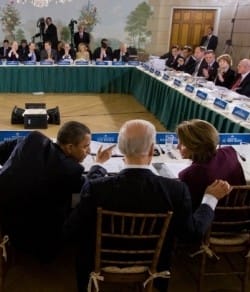Obamacare And Some Irony Just 171 Days Away

President Barack Obama discusses a point with House Speaker Nancy Pelosi, during bipartisan meeting on health insurance reform or Obamacare // Credit: Whitehouse.gov

The Affordable Care Act, or Obamacare is set to begin January 1, 2014 affecting millions of US citizens and one of the largest industries in the nation.
Accounting for caregivers such as physicians, hospitals (acute care, long-term and mental health) and home health, the census abstract shows the national expenditures for health care was 2.48 trillion dollars in 2012. Also included in this number are supporting industries such as pharmaceuticals, medical equipment and consumable supplies. Obamacare will impact approximately 16% of the US GDP.
Passed by Congress in late 2009, Obamacare was signed into law March 23, 2010. Though not the original goal of single-payer coverage hoped for by President Obama the Obamacare overhaul will be significant, providing access to health care coverage for over 30 million people.
Sweeping changes such as those Obamacare provide are often confusing, concerning and given the current climate of discord in Washington, they may often be misrepresented.
The US Department of Health and Human Services provides a reasonably clear description of what this new law means for us. The White House provides some clarification of the facts of Obamacare to assist us in the transition as well.
With expenditures climbing to astounding levels, more than doubling from 1.2 trillion dollars in 1998 to just under 2.5 trillion dollars in 2008, health care is quickly becoming inaccessible to tens of millions in the US.
In less than 50 years health care expenditures increased by a shocking 9007% from 27.3 billion dollars in 1960 to 2.48 trillion dollars in 2008. There are many factors causing the increases Obamacare is attempting to reduce including inflation, but to gain a more concise picture we need to take a quick look at the history of health insurance access; it tells a tale we simply cannot ignore.
Not terribly surprising, it was in fact a government effort that lead to the abundance of health care insurance in the US. Likely unwittingly, health care costs had been given the green light to begin its rapid ascent to the stars and beyond by President Truman.
During World War II an overwhelming percentage of the workforce entered the military and went to war, drastically reducing available labor. This and cutbacks in the form of wage controls which were necessary to help compensate for the cost of the war created a dilemma requiring a concerted effort between the government, the citizens and the manufacturers.
Truman proposed a then highly controversial plan; employer-provided health insurance. The program was intended to entice those still on the home front to fill positions left empty due to the war. Within a few short years, health insurance became a common household commodity and by the early 1960's more than 75% of the country's population was covered by health insurance.
Still not complete however, employer-provided health care insurance left a gaping hole in coverage for the elderly and those who simply couldn't afford health insurance, a gap which was later filled by Medicare and Medicaid in the mid 1960's.
As with any relatively inexpensive commodity the population began to use it at will and became, perhaps not addicted to health care, but severely dependent upon the services they had previously been denied.
An alarming trend began to appear; with access came the general misconception that health was reactive rather than proactive and people began visiting the doctor's offices, clinics and hospitals to fix the problems they no longer fixed themselves with proper exercise and healthy food choices. As you might guess, this has created an out of control snowball still picking up speed today as the US population seeks easy fixes for their ever-growing health issues.
Health care in the US is a grossly over-used service with the population visiting a health care professional often monthly, when prior to the 1940's most rarely saw a physician and then only in extreme circumstances. Yet, our overall health is decreasing with alarming rates of obesity (the US is ranked the most obese nation on Earth). The number nine spot for cancer deaths belongs to the US, 17th in suicide and 13th in heart disease. We take 1st place once again in teen pregnancies.
All this despite the fact that we spend more per capita than any other nation.
So, where's the irony in all this?
Many are concerned, substantially more than they need be, with Obamacare, fearing that it's socialism surreptitiously creeping its way into our lives. Likewise, when Truman introduced his proposal, much of the population and industry heads were adamantly opposed as they considered the concept; drum roll please: a big step towards socialism. Many also believe that US has the best health care in the world already, so why change it. But, statistics starkly belie that theory.
Are we due for an overhaul? In my opinion; a resounding yes. Will it be successful in reducing health care expenditures? Only time will tell. However, I think all government interventions have risks.
Considering our dismal health, a strong effort to educate the population in healthy living rather than health-provider dependency should be an integral part of Obamacare.
Health care is absolutely a right for every US citizen, but it's also a responsibility and we need to educate along with the overhaul.




